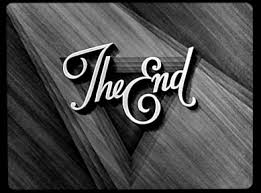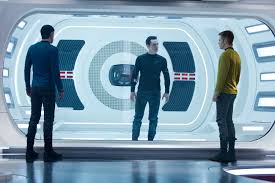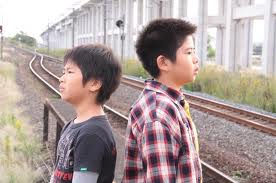It’s the 7th of May 2013: one year to the day that my father passed away.
I didn’t want to mark the occasion in a maudlin, depressing way, but I started to think about his favourite films and eventually decided to write this article. This post may be nothing more than self-indulgence, but then writing in a blog is self-indulgent, so here goes.
My father wasn’t a full-on film buff like me. Books were more his thing and that is something I inherited too (though film remains my first love). However, he did enjoy movies and certainly he was the person most directly responsible for introducing me to the joys of cinema. At which point, no doubt, many of you will say he has a lot to answer for!
I always enjoyed my father’s company at the cinema. I can think of several landmark occasions growing up where it was just the two of us. The Goonies for example is a film that I now can’t watch without shedding a tear. Objectively speaking, it isn’t even that good. In fact it’s rather loud and obnoxious. But because my father took me to it when I was ten, it was perfect for me at that age, and I remember the experience fondly.
As a teenager, I vividly recall going to see Oliver Stone’s masterpiece of paranoia JFK with my father. Afterwards I asked him how he was involved in the Kennedy conspiracy, since Stone had implicated practically everyone alive in 1963. I can’t remember his exact response, but he did refer to the director as “Oliver Grindstone” which is a name I use to this day.
My father had a great gift for summarising a film in a brilliant one-liner. They ranged from the pithy (his assessment of Austin Powers: “deeply juvenile”) to gross understatement (Se7en – a film so disturbing I needed a stiff whisky afterwards – was merely “pretty horrid”). Occasionally he was amusingly damning with faint praise (on Eminem’s 8 Mile: “an interesting cultural experience” – particularly funny as my Dad and rap music were like oil and water).
One of the best things about my father was that he didn’t ever lose his sense of silliness. On his very last visit to my home in late 2011, my children urged him to watch Underdog with them – a truly ridiculous piece of work about a superhero dog. He agreed, I assumed with reluctance. But he laughed his head off throughout, enjoying the film as much as the children!
I have no idea what my Dad’s favourite film actually was. He didn’t have my borderline OCD need to categorise everything. But here, in no particular order of merit, are just ten films that were really special to him for various reasons:
Where Eagles Dare (1969) – A truly ridiculous, outrageously entertaining World War II adventure story in which Clint Eastwood probably guns down more Nazis than were killed on the entire Russian front. The film is absolutely jammed packed with gunfights, chases, stunts, tripwire bombs and huge explosions; not to mention enough plot twists to render the narrative completely incoherent at times. But that is precisely what makes it so amusing. This is the kind of film where our escaping heroes stop to blow up a bridge not for any particular strategic objective, but because they can. My father absolutely loved it.
Whisky Galore! (1949) – As a Scotsman, my father was genetically predisposed to love this great Ealing comedy about a whisky deprived wartime island community who can’t believe their luck when a whisky laden cargo vessel is shipwrecked off their shores. Like me, he loved the hilariously un-PC message: drinking is good for you. Well, it must be as it enables Gordon Jackson to stand up to his hysterically overbearing mother.
Scrooge (1951) – A Christmas Carol was probably my father’s favourite Dickens’ story and this film is still the definitive adaptation. Alistair Sim is superb in the lead role, and whilst the Muppet version has overtaken this in the affections of some, my father still preferred this bleaker, spookier version that sacrificed none of the darker edges of the original text.
The Secret Life of Walter Mitty (1947) – My father was a huge fan of comedian Danny Kaye, and this is an example of his best work. Walter Mitty is a bored pulp-fiction writer who constantly drifts into heroic daydreams. However, when he suddenly finds himself at the centre of a conspiracy involving hidden crown jewels, he discovers being a hero isn’t all that easy after all.
Bambi (1942) – This was my father’s all-time favourite Disney animated feature, and for the record it is also mine. I understand he saw it at the cinema as a child and it had much the same effect on him as ET did on me. Not surprising as it is a masterpiece – great animation, brave storytelling, and some properly traumatising moments.
Doctor Zhivago (1965) – The film that introduced me to the cinematic giant that is David Lean. My father showed it to me, and afterwards I begged him to let me see every single Lean film whenever they cropped up on television (bear in mind this was back in the Stone Age before downloads, blu-rays, DVDs, etc – even a VHS copy was hard to come by back then). Years later we caught a cinema re-release together which was a wonderful experience. This remains one of my favourite epic romantic tragedies, and it was probably my father’s absolute favourite in that particular genre.
Shane (1953) – Of this, my father’s favourite western, he once said “if you don’t cry at the end of this, you won’t cry at the end of anything”. Shane is a classic western, and the ending is very memorable. But for me, more memorable still is the experience of watching it for the first time with my father.
North by Northwest (1959) – Like my father, I prefer Hitchcock’s espionage thrillers to his horror stories. This was the first Hitchcock film my father showed me, and he always went on and on about how much better it was on a big screen – especially during the iconic crop duster scene. During a reissue in the 1990s, I saw this at the cinema and suddenly understood what he was talking about…
Schindler’s List (1993) – Steven Spielberg’s astonishing, three hours plus monochrome Holocaust epic about the life of Oscar Schindler remains my favourite film of the 1990s, and I think it was my father’s too. We were both shaken and speechless afterwards, and ended up seeing it several times. Anyone who has seen it will understand why.
Back to the Future (1985) – I vividly recall telling my father that he must see this. Then he came to the cinema with me to see it, and in turn insisted that my mother and sister must see this. In subsequent years, because it was set in the 50s and the 80s, my father and I both got a major nostalgia kick out of it. My father wasn’t big on science fiction (he preferred fantasy, so Star Wars rather than Star Trek) but he loved a good time travel story, especially this one. Then again there isn’t a person in the world who doesn’t love Back to the Future. Well, actually I have met one such person, but don’t worry. I recommended that they seek urgent medical attention.
Now I’m wondering if I shouldn’t have included at least one James Bond film. Or The Graduate, The Great Escape, The Sound of Music, The Prime of Miss Jean Brodie… Or possibly something more recent like Hugo or The Lives of Others? All films I know he loved. Never mind. No doubt my father has a special private cinema in heaven with pristine prints of all these films.
Hope you’re having a great time up there Pop. I miss you.





